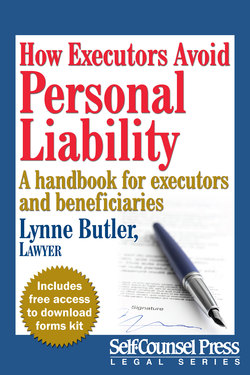Читать книгу How Executors Avoid Personal Liability - Lynne Butler - Страница 11
На сайте Литреса книга снята с продажи.
7. The Executor’s Powers Provided by the Will
ОглавлениеThe quality of any given will depends on the expertise of the lawyer or other person who drew it up, as well as the circumstances under which the will was prepared. Wills that are done hurriedly, such as death bed wills, may be simpler and may even be prepared without the benefit of legal advice. Some testators use will kits or forms found on the Internet; this can work quite well if care is taken to select a form for the right jurisdiction and if the kit’s instructions are carried out properly. Mistakes can be made, whether or not a lawyer has been involved.
The best wills contain paragraphs that are referred to as “executor’s powers” or “executor’s authorities.” When you begin working as an executor, you should read the will carefully to note which powers are provided for you. The purpose of these powers is to smooth the administration of the estate by allowing the executor to take certain steps without needing the permission of the beneficiaries or of the court.
As mentioned, the quality of wills varies. The better the quality of the will, the more you, as executor, are protected. This is because the lawyer who drew the will would have anticipated the steps you are going to take to administer the estate and would have included the specific powers you need to do that. In an estate where there are no disputes or struggles, the powers may be less crucial, but in most estates, the executor must rely on the powers for his or her legal authority to carry out certain tasks.
Even though federally it is implied that administrative tasks may be outsourced by the executor, some of the specific powers that you should be able to find in the will you are administering are:
• Power to sell real estate.
• Power to make income tax elections.
• Power to hire agents such as accountants, lawyers, or realtors.
• Power to give items to beneficiaries in specie, which means the ability to give a beneficiary an actual item without having to sell the item and give the beneficiary the funds.
Some wills need more powers than others, based on the needs of the person whose will it is. For example, a person who owns a business should have a will that allows his or her executor to carry on the business until the company is sold, and to deal with corporate matters such as registry filings and corporate resolutions.
When there are minor beneficiaries of the estate, further powers are needed to let the executor know who may handle money on behalf of the minor.
The lack of these powers in the will is a tricky situation for executors. Where the powers are present in the will, you can carry out the steps you need to take based on the will. Where the powers are absent, local law often requires either the written consent of all of the beneficiaries, or an order of the court allowing you to take the step. Be cautious when you want to carry out steps for which there is no specific power given. You may wish to consult a lawyer for an opinion on whether you have the legal authority to take steps such as:
• Selling, winding down, or carrying on a business.
• Selling a home even though there is enough money in the estate to pay the debts without selling the home.
• Rolling over an RRSP or RRIF to a spouse.
• Settling a lawsuit or claim on behalf of the estate.
